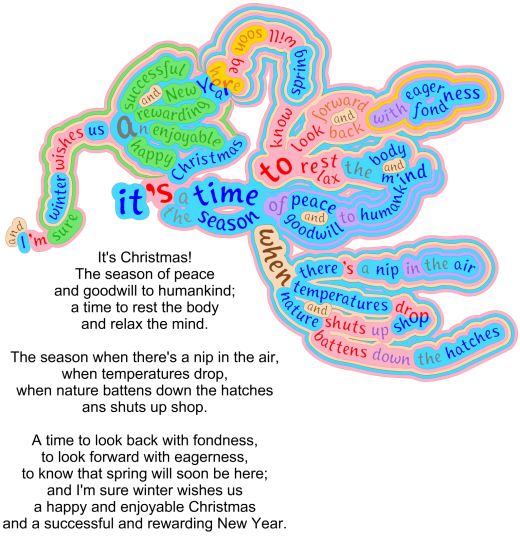Letter 1
Dear Hania,
Muhammad Iqbal from the Global Issues Special Interest Group of IATEFL has kindly put me in touch with you. I run a small language school in Lostwithiel, Cornwall. An article about my ethical language school was published in the December issue of GISIG last year. Thanks to another article in the same newsletter I now perceive myself as much as a 'global educator' as a language teacher!
I have won two awards for my language school. In the Cornwall Sustainability Awards last year, it was placed third in the category "Best Small Business: reducing environmental impact". Earlier this year I received a Gold Award from the Green Business Tourism Scheme.
This summer I completed my MA in "Contemporary European Culture: Language, Literature and Society" with a 20,000 word dissertation on "The Cornish Language and Cornish Identity". The Cornish language was recognised in 2001 as a European Regional or Minority Language. Since I am a Cornish person and the Cornish language is described as an identity language, the focus of my research was to work out for myself which of the various forms of the language that are currently competing to be selected as the Standard Written From I would choose to teach in my language school.
I am now one of a small group of language consultants working with Asset organisation in Cambridge to introduce Cornish into schools through the Languages Ladder. I have taught Cornish to 20 children at our local nursery in Lostwithiel so far this year. My language school offers what is probably the only residential course in the world where people can come and learn Cornish.
I am in the process of writing an article for the next GISIG newsletter on the Cornish language. In the application for the Sustainability Award last year, I linked eco-linguistics with bio-diversity. I see sustainability as an integrated approach to various aspects of life: economic, social, environmental, cultural and spiritual.
During the past year, I have been acting as the co-ordinator of Transition Lostwithiel.
You can find out about the Transition Towns movement through these websites:
www.transitionculture.org and www.transitiontowns.org
The Transition movement seeks to enhance community resilience to face the twin challenges of peak oil and climate change. It is a grass roots movement which was started by Rob Hopkins, a lecturer in permaculture, with his students at Kinsale in Ireland. Rob Hopkins then moved to Plymouth University to research the concept of planned energy descent plans for communities. Totnes became the first registered Transition Town two years ago and West Penwith in Cornwall followed soon after as a Transition community. We registered as Transition Lostwithiel earlier this year and have our first public events starting tomorrow!
The Transition movement has spread to Australia. New Zealand is also warming up to the idea. On a recent training course in Totnes, I met people who were taking on 'Transition Brirmingham'!
I am keen to attract people to my language school who may be interested in these issues. I am also keen to stimulate global debate about these vital issues.
Sorry to send you such a long initial email, Hania, but I wanted to convey the inter-relatedness of the issues I am dealing with. Maybe there are others who share the same concerns with both local and global issues.
Please let me know if you would be interested in publishing an article from me of some description in HLT.
Thanks/merastawhy,
Julie Tamblin
Co-ordinator Transition Lostwithiel
http://www.learnenglishincornwall.co.uk
Learn English in Cornwall

Letter 2
This is a first announcement about the new ELT Wiki - an ELT glossary resource that, with your help, will develop into something really useful for teachers, trainers and trainees.
To learn more about it go to http://www.jeremy-harmer.com/tesol
(and you might want to see the latest interview at the same website with Deborah Cameron, author of Verbal Hygiene and her latest book The Myth of Mars and Venus. It’s on the 'Features' page, and there’s some good brass music on the ‘music page’ and..)
Do please tell anyone you can think of about the wiki. It’s very basic at the moment, but it can grow into anything you want it to!
Oh, and have A very happy and successful new year!
Jeremy

Letter 3
Dear Hania
I thank you a lot for sending me the information and articles you are currently publishing and sharing your and others teachers ideas. This time, I am very amazed how you are encouraging teachers to write as a Host Country, Latin American Countries. It would be fantastic to take part as one of your contributors, specially for the tenth anniversary I have never thought about it before. I would like to know the deadline to submitt the articles.
Kind regards
Edy Isabel Torres

Letter 4 a
salam it's me ruba sadi i'm working now in a private school " I EC" i will be grateful if u can help me in the following issues:
- game s to apply in the intermidiate classes for vocab or structure
- how to deal with weak students

Letter 4 b
Dear Ruba, if I may
thank you for getting in touch with me
I am afraid you will have to take a look at the archive of HLT yourself, use the search engine and find the materials that you need. HLT does not provide the service your require. I hope you will enjoy reading HLT.
Many greetings and Happy New Year
Hania

Letter 5

from David Warr



|